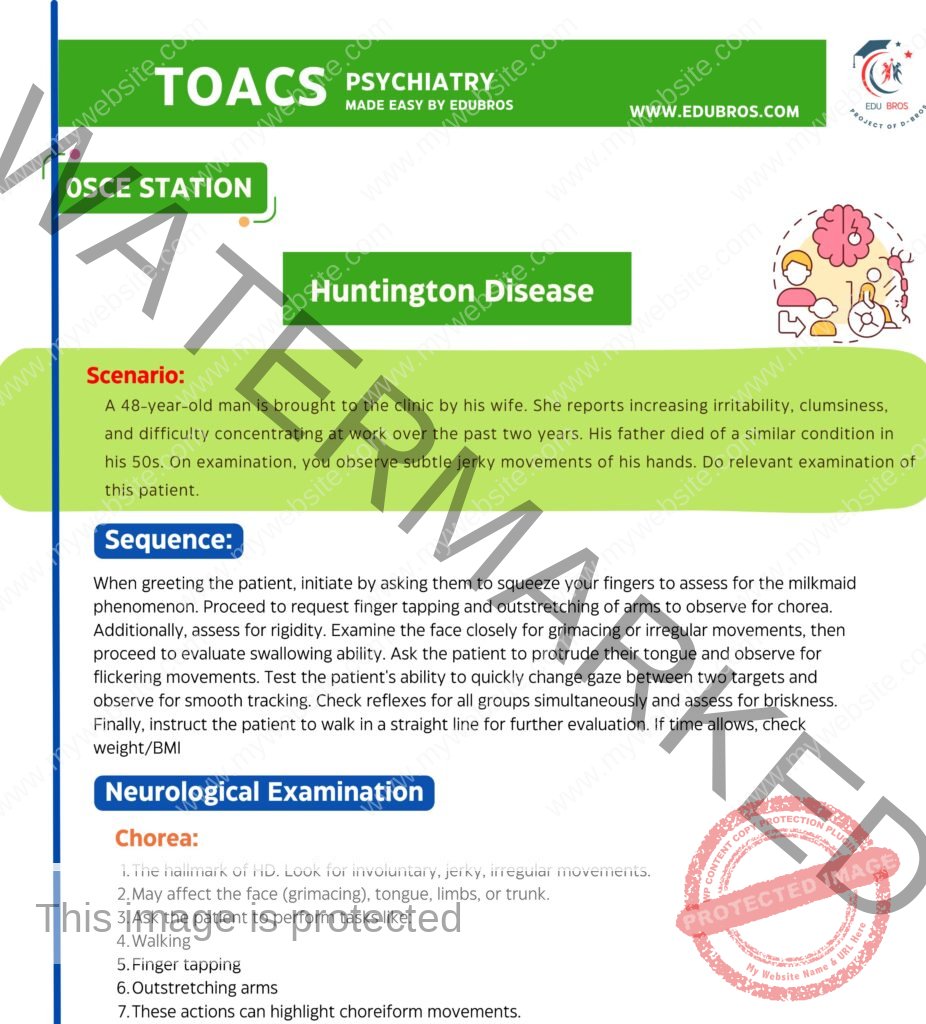Introduction to TOACS
TOACS (Task-Oriented Assessment of Clinical Skills) is a key part of the Psychiatry exam conducted by the College of Physicians and Surgeons Pakistan (CPSP). This exam isn’t just about testing your clinical knowledge—it also checks how well you manage time and perform under pressure. This guide covers the exam format, common mistakes to avoid, time management tips, and the best preparation strategies to help you perform at your best. This guide contains everything you need to easily pass your TOACS exam in Psychiatry.
TOACS Format: Structure and Key Details
Number of Stations
You will face a total of 12 stations during the exam.
Stick to the Time Limit
You will get exactly 5 minutes per station—no extra time is given. It is crucial to practice under this strict time limit.
- Learn to phrase your questions concisely to perform tasks within the time limit.
- Take 10–15 seconds to form a mental strategy before speaking.
Station Scenarios
Each station presents a clinical scenario where you must first identify the likely diagnosis and then complete a specific task (e.g., a relevant physical examination). For example, a scenario might describe a patient on psychiatric medication who develops muscle stiffness and fever. Your job is to identify Neuroleptic Malignant Syndrome (NMS) and perform the relevant examination.
Remember: Stations test your skills at an evaluative level. Expect clinical vignettes, not straightforward instructions like “perform a physical examination of NMS.”
Time Management: Strategies for Efficiency
Avoid Lengthy Introductions
Do not waste time on long greetings or overly formal consent-taking. A quick, 1-2 sentence introduction covering these points is sufficient. These sections carry minimal marks (0.5 to 1), so move quickly to the main task.
Focus on the Main Task
Each station has a clear, primary objective. Your priority is to achieve it.
- If it’s a physical examination, begin immediately.
- If it’s a risk assessment, ask key questions directly and clearly.
Remember: Not completing the main tasks within the given time can cost you important marks.
Common Mistakes and How to Fix Them
- Partial Knowledge: Score marks even if you’re not 100% sure.
- Stay Confident: Don’t let one hard station affect the rest.
- Clear Communication: Language proficiency is secondary to clinical skills.
All-or-None Thinking
Many candidates worry about perfection. In reality, partial knowledge can still earn significant marks. For example, if you suspect NMS but are unsure, proceed with a focused neurological exam based on the symptom of muscle rigidity to secure partial marks.
Losing Confidence After the First Station
Every exam has 2-3 new, difficult stations. If your first station feels tough, don’t lose hope—it is likely difficult for everyone. Focus on getting as many marks as you can, then move on without carrying the burden of the previous one.
Language Concerns
Examiners primarily assess your clinical skills and knowledge, not language proficiency. Speak clearly in the language you are most comfortable with (English or Urdu).
Evolving Focus: Emerging Trends in CPSP TOACS
Recently, CPSP has started emphasizing skills beyond traditional psychiatry. Be prepared for stations covering:
Administrative Responsibilities
- Setting up clinics (e.g., anger management).
- Resolving departmental conflicts.
- Writing discharge reports and organizing events (e.g., World Mental Health Day).
Research and Critical Appraisal
- Understanding research designs like Randomized Controlled Trials (RCTs).
- Interpreting a forest plot and using Boolean Operators for literature reviews.
Psychotherapy Approaches
- Key points of Cognitive Behavioral Therapy (CBT).
- Techniques like deep breathing and progressive muscle relaxation (PMR).
High-Yield Pharmacology
- Managing medications like Clozapine and Lithium, including side effects, monitoring, and use in pregnancy.
Practical Tips for the Exam Day
Carry Necessary Instruments
Bring your own stethoscope, pen torch, and reflex hammer. Relying on provided equipment can add unnecessary stress.
Maintain Professional Attire & Conduct
Wear a clean lab coat. Greet examiners and mock patients politely, and thank them at the end of each station.
Stay Focused and Calm While Waiting
Avoid discussing stations with other candidates, as it can cause anxiety. Quietly review your notes or important concepts instead.
Mind Your Body Language
Appear confident, calm, and attentive. Even if a station is difficult, maintain your composure to maximize your score.
TOACS Psychiatry – The Complete Course
There’s no book that fully covers the TOACS Psychiatry exam. To fill this gap, we created a complete course in 2023 and have been updating it ever since.
- 100% exam coverage – Every possible station included.
- Easy-to-understand notes – Feels like practicing while reading.
- Proven success – Alhamdulillah, almost all students passed on the first attempt!
InshaAllah, this will be enough for you too!

